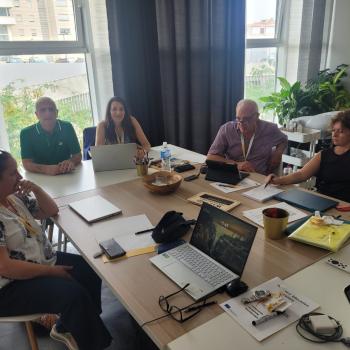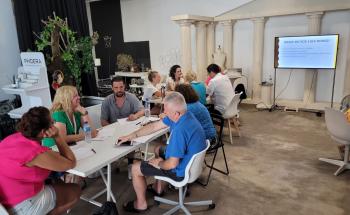
Emotional Intelligence Tools in Education
This is a practical and interactive course designed to equip participants with valuable strategies and skills applicable in various professional settings. It focuses on self-regulation techniques, communication strategies, and conflict-resolution skills, providing universal tools for individuals across different industries.
Description
During the course you will gain insights into fostering a positive and harmonious work environment, enhancing their ability to navigate challenging situations with resilience and professionalism. The program offers practical solutions for workplace scenarios and contributes to individuals' overall well-being and effectiveness in diverse professional roles. Day 1. Monday
- Welcome and introductions;
- Individual expectations, setting objectives for the week;
- Getting to know each other & ice-breakers;
- Self-awareness and Trigger Identification;
- Recognising potential challenges in the classroom;
- Self-assessment activities on recognising triggers.
Day 2. Tuesday
- Conditioning and programming;
- Unhealthy coping mechanisms & unhealthy reactions and habits;
- Healthy and constructive responses.
Day 3. Wednesday
- Managing overreactions;
- Mental toughness and emotional regulation;
- Bouncing back from challenges;
- Personal choice and personal responsibility;
- Steps to take to help you stay above the line.
Day 4. Thursday
- Scenarios of operating below or above the line;
- Assess if learning objectives have been learned;
- Role-play;
- Communication and conflict resolution in practice.
Day 5. Friday
- Fun activity. Positive reinforcement;
- Feedback and evaluation;
- Certificate of attendance;
- Cultural visit in the local area.
Learning objectives
Self-awareness and Trigger Identification:
- Develop a heightened self-awareness to identify personal triggers and emotional responses, enabling participants to recognise potential challenges in the workplace proactively.
Effective Self-Regulation Techniques:
- Acquire diverse evidence-based self-regulation techniques tailored for educators and non-teaching staff, empowering them to manage stress, frustration, and other triggers in real time, fostering a more composed and focused working environment.
Enhanced Communication and Conflict Resolution:
- Strengthen communication skills and conflict resolution strategies, equipping participants with the ability to deftly navigate challenging interactions with students, colleagues, and parents, fostering a positive and collaborative atmosphere.
Application of Self-Regulation Strategies and Roleplays
- Learn how to translate acquired self-regulation skills into practical interventions. Participants will be equipped to model self-regulation techniques promoting a culture of emotional intelligence, resilience, and optimal positive outcomes.
Upon successful completion of the course, participants will receive a Certificate of Attendance highlighting their achievement and the skills gained through the program.
Methodology & assessment
Interactive Workshops: Hands-on sessions with exercises to develop and apply EI tools, providing real-time feedback.
Case Studies and Scenarios: Analysis of real-life and hypothetical cases to explore practical EI solutions.
Group Discussions and Role-Plays: Collaborative activities to practice EI skills such as empathy and effective communication.
Theoretical Insights: Introduction to foundational EI theories and their relevance to education.
Reflective Practices: Encouragement of personal reflection to identify and enhance EI strengths and areas for improvement.
Toolkits and Resources: Provision of practical tools and resources for implementing EI strategies in educational settings.
Assessment:
Participants' progress will be assessed through:
Practical Application: Evaluation of the ability to apply EI tools in educational scenarios and handle emotional situations effectively.
Case Study Analysis: Assessment of solutions proposed for case studies, demonstrating practical integration of EI concepts.
Participation and Engagement: Monitoring of active involvement in workshops and discussions to ensure skill application and development.
Feedback and Evaluation: Continuous feedback from instructors and peers, with a final evaluation of overall grasp and application of EI concepts.
Certification details
Participants will receive an Attendance Certificate, which will detail the course title, program content, and schedule. Additionally, upon request, we can provide a Europass Mobility Certificate. This certificate serves as a valuable record of the skills and competencies acquired during the course, and it is recognized across Europe.
Pricing, packages and other information
-
Price:450Euro
Additional information
-
Language:English
-
Target audience ISCED:Primary education (ISCED 1)Upper secondary education (ISCED 3)Other
-
Target audience type:Teacher EducatorCompany staffOther
-
Learning time:25 hours or more
Upcoming sessions
Past sessions
More courses by this organiser

English for Beginners (A1 and A2 Levels)

Intercultural Skills for Better Communication


